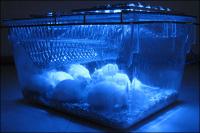研究人员已经找到用光启动细胞中特定基因的技术,并将改造细胞成功移植到小鼠体内。将眼睛的感光分子装置固着在细胞的基因表达系统上,可应用于产生精确数量的药物蛋白质,或用来控制基因或细胞疗法的伎俩。
黑视素是视网膜表面的感光色素,接受蓝光刺激后,触发钙离子快速涌入细胞内,胞内高浓度的钙离子激活转录因子NFAT的信号级联反应。Haifeng Ye及其同事将黑视素基因和另外1个靶基因同时转入细胞中,该靶基因插入的位置是可被转录因子NFAT转录的。蓝光对改造细胞照射后,黑视素的感光功能被激活并导致靶基因表达。
作者用这种技术诱使细胞产生特定数量的蛋白质(如人类的糖蛋白SEAP),该蛋白的制备是制药工业面临的一个挑战。Ye及其同事还尝试将极少量的改造细胞植入到小鼠体内,表达SEAP的细胞与传送蓝光的光纤一起注射到小鼠的腹腔内,同时表达shGLP-1的细胞注射到小鼠的皮下组织中。研究人员发现,蓝光短距离照射48小时后,小鼠体内shGLP-1和胰岛素的浓度都增加,而这两种蛋白质的作用可中和小鼠注射一剂葡萄糖后的血糖浓度。

蓝光可激活小鼠皮下移植细胞的基因表达
生物探索推荐英文摘要
A Synthetic Optogenetic Transcription Device Enhances Blood-Glucose Homeostasis in Mice
Abstract:Synthetic biology has advanced the design of genetic devices that can be used to reprogram metabolic activities in mammalian cells. By functionally linking the signal transduction of melanopsin to the control circuit of the nuclear factor of activated T cells, we have designed a synthetic signaling cascade enabling light-inducible transgene expression in different cell lines grown in culture or bioreactors or implanted into mice. In animals harboring intraperitoneal hollow-fiber or subcutaneous implants containing light-inducible transgenic cells, the serum levels of the human glycoprotein secreted alkaline phosphatase could be remote-controlled with fiber optics or transdermally regulated through direct illumination. Light-controlled expression of the glucagon-like peptide 1 was able to attenuate glycemic excursions in type II diabetic mice. Synthetic light-pulse–transcription converters may have applications in therapeutics and protein expression technology.







